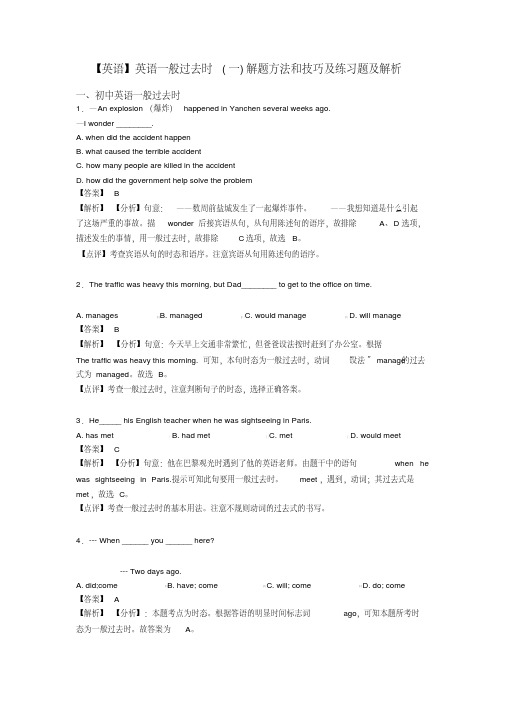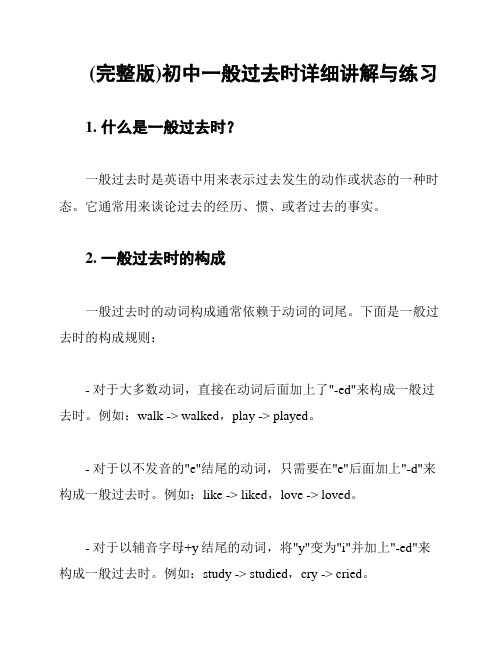初中英语语法专项突破之英语一般过去时讲解与练习
【英语】英语一般过去时(一)解题方法和技巧及练习题及解析

【英语】英语一般过去时(一)解题方法和技巧及练习题及解析一、初中英语一般过去时1.—An explosion (爆炸) happened in Yanchen several weeks ago.—I wonder ________.A. when did the accident happenB. what caused the terrible accidentC. how many people are killed in the accidentD. how did the government help solve the problem【答案】 B【解析】【分析】句意:——数周前盐城发生了一起爆炸事件。
——我想知道是什么引起了这场严重的事故。
描wonder后接宾语从句,从句用陈述句的语序,故排除A、D选项,描述发生的事情,用一般过去时,故排除C选项,故选B。
【点评】考查宾语从句的时态和语序。
注意宾语从句用陈述句的语序。
2.The traffic was heavy this morning, but Dad________ to get to the office on time.A. managesB. managedC. would manageD. will manage【答案】 B【解析】【分析】句意:今天早上交通非常繁忙,但爸爸设法按时赶到了办公室。
根据The traffic was heavy this morning.可知,本句时态为一般过去时,动词“设法”manage的过去式为managed。
故选B。
【点评】考查一般过去时,注意判断句子的时态,选择正确答案。
3.He_____ his English teacher when he was sightseeing in Paris.A. has metB. had metC. metD. would meet【答案】 C【解析】【分析】句意:他在巴黎观光时遇到了他的英语老师。
2023年初中英语语法一般过去时讲解及练习

一般过去时表示过去一些时间发生的动作或存在的状态,也可表示过去经常或反复发生的动作。
常和yesterday, ago, last week等表示过去的时间状语连用。
一、概念表示在的过去一些时间里所发生的动作或存在的状态。
通常在句子里找到表示过去时间的词或词组。
如:yesterday,yesterday morning,yesterday afternoon,yesterday evening,the day beforeyesterday(前天),last night,last week,last month,last year,a momentago(刚才),just now(刚才),two days ago,a week ago,in 1990等。
如:I went to bed ateleven last night.昨晚我11:00睡觉。
二、动词过去式的构成规律(一)规则动词的过去式1.一般情况下,在动词原形后面加-ed;如:look→lookedplay→played;2.以不发音e结尾的动词,在词尾直接加-d;如:live→liveduse→used;3.以“辅音字母+ y”结尾的动词,先将y改为i ,再加–ed;如:study→studied, try→tried fly→flied4.以重读闭音节(即辅音+元音+辅音)或r音节结尾,末尾只有一个辅音字母的动词,要先双写这个辅音字母后,再加–ed。
如:stop→stoppedplan→planned;(二)不规则动词的过去式1.改变动词中的元音;2.变词尾的–d为–t ; build→built lend→lent send→sent spend→spent bend→bent3.与动词原形一样; cut→cut put→put cost→cost hurt→hurt shut→shut4.变-ay为-aid (少数动词); say→said pay→paid lay→laid5.采用不同词根;sell→sold teach→taught buy→bought6.其他。
初中一般过去时讲解及练习

初中一般过去时讲解及练习学习一般过去时一般过去时的构成及用法1、一般过去时用法 :一般过去时表示过去某个时间里发生的动作或状态;过去习惯性、经常性的动作、行为;过去主语所具备的能力和性格。
2、构成:a. be 动词的一般过去时态am is 的过去式为was; are的过去式为were.构成:肯定句:主语+was (were) +表语如:I was late yesterday. (昨天我迟到了。
)否定句:主语+was (were) +not+表语如:We weren't late yesterday. (我们昨天没迟到)疑问句:Was (Were) +主语+表语如: Were you ill yesterday? (你昨天病了吗,)肯定回答: Yes, I was. (是的,我病了。
)否定句: No, I wasn't. (不,我没病。
)特殊疑问句: 特殊疑问词+was (were) +主语+表语如:How were you yesterday? 你昨天身体如何,b( 实义动词的一般过去时态肯定句要使用动词的过去式,否定句和疑问句要使用助动词did .肯定句为:主语+动词过去式+状语/宾语。
如: I went home at nine o'clock yesterday.(我昨天九点钟回的家。
) 否定句:主语+didn't +动词原形+宾语如:I didn't go home yesterday. (我昨天没回家。
)疑问句:Did +主语+动词原形+宾语,如: Did you go home yesterday? (你昨天回家了吗,)肯定回答: Yes, I did. (是的,我回了。
)否定回答:No, I didn't. (不,我没回家。
)特殊疑问句:特殊疑问词+一般过去时的一般疑问句,When did you go home yesterday?你昨天什么时候回家的,c. 行为动词的一般过去式变化规则:行为动词的过去式有规则变化和不规则变化两种。
(完整版)初中一般过去时详细讲解与练习

(完整版)初中一般过去时详细讲解与练习1. 什么是一般过去时?一般过去时是英语中用来表示过去发生的动作或状态的一种时态。
它通常用来谈论过去的经历、惯、或者过去的事实。
2. 一般过去时的构成一般过去时的动词构成通常依赖于动词的词尾。
下面是一般过去时的构成规则:- 对于大多数动词,直接在动词后面加上了"-ed"来构成一般过去时。
例如:walk -> walked,play -> played。
- 对于以不发音的"e"结尾的动词,只需要在"e"后面加上"-d"来构成一般过去时。
例如:like -> liked,love -> loved。
- 对于以辅音字母+y结尾的动词,将"y"变为"i"并加上"-ed"来构成一般过去时。
例如:study -> studied,cry -> cried。
- 部分动词的一般过去时需要进行不规则变化。
例如:go -> went,eat -> ate。
3. 一般过去时的用法一般过去时通常用来描述以下情况:- 过去发生的动作:I walked to school yesterday.- 过去的经历:He lived in London for five years.- 过去的事实:She was a teacher in the past.4. 一般过去时的句型练下面是一些练,帮助加深对一般过去时的理解和运用:1. 请用一般过去时填空:Yesterday, I ________ (watch) a movie at home.2. 完成句子:He _____ (visit) his grandparents last summer.3. 改写句子,使用一般过去时:I read a book yesterday. (改为否定句)4. 改写句子,使用一般过去时:They played basketball in the park. (改为疑问句)5. 总结一般过去时是用来表示过去发生的动作或状态的一种时态。
突破初中语法:一般过去时(附中考真题及解析)

一般过去时01一般过去时的概念一般过去时用来表示过去某一时间内发生的动作或存在的状态以及过去习惯性、反复性的动作。
谓语动词要用动词的过去式,常和表示过去的时间状语连用,如y e s t e r d a y昨天、l a s t n i g h t昨晚、l a s t w e e k上周、l a s t y e a r去年、…a g o等。
02一般过去时结构⒈Be 动词的一般过去时在没有实义动词的句子中使用be 动词am is 的过去式为was,are 的过去式为were,was 是表示单数,were 是表示复数。
肯定句式:主语+be(was,were)其它否定句式:主语+be(was,were)+not其它一般疑问句:Be(was,were)主语+其它?⒉实义动词的一般过去时态肯定句要使用动词的过去式,否定句和疑问句要使用助动词did.肯定句式:主语+动词(过去式)+其它否定句式:主语+didn't+动词(原形)+其它(did not=didn't)一般疑问句:Did+主语+动词(原形)+其它(do,does的过去时均为did)注:did 和didn't 是构成一般过去时的助动词,其特点是要在其后跟动词的原形。
03 规则动词的过去式⒈一般情况下,在动词原形后面加-ed如:looked,played,started,visited,stayed⒉以不发音e结尾的动词,在词尾直接加-d如:lived,closed,liked,loved,tasted⒊以“辅音字母+y”结尾的动词,先将y改为i再加-ed如:study→studied,try→tried,cry-→cried,copy→copied,carry-→carried⒋以重读闭音节(即辅音+元音+辅音)或r音节结尾,未尾只有一个辅音字母的动词,要先双写这个辅音字母后,再加-ed如:stop→stopped,plan→planned04不规则动词的过去式一、AAA型(原形→原形→原形)二、ABA型(原形→过去式→原形)三、ABC型1. ow →ew →own2. i→a →u3. 原形→过去式→过去式+(e)n4. 原形→过去式→原形+(e)n5. 无规律四、ABB型1. 原形→ought →ought2. 原形→aught →aught3. 变其中一个元音字母4. 原形→□t→□t5. 变其中一个辅音字母6.辅音字母和元音字母都变五、AAB型六、有两种形式七、情态动词05 一般过去时的用法⒈表示过去某个特定时间发生的动作或存在的状态常有明确的时间状语,如yesterday,last night,some years ago,in 1890 等,以及由when 等引导的时间状语从句。
初中英语语法一般过去时专项讲解及练习

初中英语语法一般过去时专项讲解及练习一般过去时是英语中常用的时态之一,用来表示发生在过去某个具体时间的动作或状态。
以下是一般过去时的用法及一些练题。
一般过去时的用法1. 表示过去某个具体时间发生的动作或状态。
- I played football yesterday.(我昨天踢了足球。
)- She was a teacher two years ago.(两年前她是一名老师。
)2. 表示过去经常性、惯性的动作或状态。
- We always went swimming in the summer.(我们夏天经常去游泳。
)- He used to live in the countryside.(他过去住在乡下。
)3. 表示过去的客观事实或真理。
- The sun rose in the east.(太阳从东方升起。
)- She knew the answer.(她知道答案。
)一般过去时练题请根据句子的意思,在括号中填上适当的动词的过去式。
1. My friend __________ (visit) me last week.(我朋友上个星期来看我。
)2. They __________ (watch) a movie yesterday evening.(他们昨晚看了一部电影。
)3. Helen and I __________ (play) tennis together when we were children.(海伦和我小时候一起打网球。
)4. He __________ (not go) to school yesterday because he was sick.(他昨天因为生病没去上学。
)5. We __________ (live) in that house for five years before we moved.(我们在那个房子住了五年才搬走。
)总结一般过去时用于表示过去某个具体时间发生的动作或状态,过去的经常性、习惯性动作或状态,以及客观事实或真理。
(完整版)中学一般过去时详细讲解与练习

(完整版)中学一般过去时详细讲解与练习一般过去时的使用一般过去时是英语中表示过去发生的动作、状态或惯的一种时态。
在一般过去时中,动词的过去式形式通常用来表示过去的时间。
以下是一般过去时的使用情况:1. 表示过去发生的动作一般过去时可以用来表示过去已经完成的动作。
例如:- He played soccer yesterday.(他昨天踢足球。
)- She went to the beach last weekend.(她上周末去了海滩。
)2. 表示过去的状态或特征一般过去时也可以用来描述过去的状态或特征。
例如:- They were happy when they received the news.(当他们收到那个消息时他们很开心。
)- The house was big and beautiful.(那个房子又大又漂亮。
)3. 表示过去的惯一般过去时还可以用来表示过去经常性的动作或惯。
例如:- I always ate breakfast before going to school.(我过去上学前总是吃早餐。
)- She often went for a run in the evening.(她过去经常在晚上去跑步。
)一般过去时的构成与规则动词变化- 对于大多数动词,一般过去时的构成是在动词原形后面加上-ed。
例如:play → played, work → worked。
- 对于以e结尾的动词,只需要加-d。
例如:live → lived。
- 对于以辅音字母+y结尾的动词,将y变为i然后加-ed。
例如:study → studied。
- 对于以辅音字母结尾的重读闭音节动词,重读闭音节的辅音字母要双写,再加-ed。
例如:stop → stopped。
- 一些动词的过去式形式是不规则的,需要特殊记忆。
例如:go → went, eat → ate。
一般过去时的练以下是一些练,帮助你巩固一般过去时的使用和动词形式变化:1. Fill in the blanks with the correct past tense form of the verbs:- She __________ (watch) a movie last night.- They __________ (visit) their grandparents on the weekend.- He __________ (study) math for two hours yesterday.2. Rewrite the sentences in the past tense:- I go to school every day. (改为过去时)- Jane plays tennis on Saturdays. (改为过去时)- We eat pizza for lunch. (改为过去时)- She __________ (go/went) to the party last night.- We __________ (see/saw) a movie at the cinema.- He __________ (run/ran) in the race and won.请根据上述讲解和练习进行学习和练习,巩固中学一般过去时的用法和动词形式变化。
初中英语语法专项突破之英语一般过去时讲解与练习学习的啊学习的武器学习的武器

学英语简单吗?肯定会有许多学生说:“难死了”。
为什么有好多学生对英语的学习都感到头疼呢?答案只有一个:“不得法。
” 英语与汉语一样都是一种语言,为什么你说汉语会如此流利?那是因为你置身于一个汉语环境中,如果你在伦敦呆上半年,保准说起英语来会非常流利。
但很多中学生没有很好的英语环境,那么你可以自己设置一个英语环境,坚持“多说”、“多听”、“多读”、“多写”,那么你的英语成绩肯定会很出色。
一、多“说”。
自己多创造机会与英语教师多讲英语,见了同学,尤其是和好朋友在一起时尽量用英语去问候,谈心情……这时候你需随身携带一个英汉互译小词典,遇到生词时查一下这些生词,也不用刻意去记,用的多了,这个单词自然而然就会记住。
千万别把学英语当成负担,始终把它当成一件有趣的事情去做。
或许你有机会碰上外国人,你应大胆地上去跟他打招呼,和他谈天气、谈风景、谈学校……只是别问及他的年纪,婚史等私人问题。
尽量用一些你学过的词汇,句子去和他谈天说地。
不久你会发现与老外聊天要比你与中国人谈英语容易的多。
因为他和你交谈时会用许多简单词汇,而且不太看重说法,你只要发音准确,准能顺利地交流下去。
只是你必须要有信心,敢于表达自己的思想。
如果没有合适的伙伴也没关系,你可以拿过一本书或其它什么东西做假想对象,对它谈你一天的所见所闻,谈你的快乐,你的悲伤等等,长此坚持下去你的口语肯定会有较大的提高。
二、多“听”寻找一切可以听英语的机会。
别人用英语交谈时,你应该大胆地去参与,多听听各种各样人的发音,男女老少,节奏快的慢的你都应该接触到,如果这样的机会少的话,你可以选择你不知内容的文章去听,这将会对你帮助很大,而你去听学过的课文的磁带,那将会对你的语言语调的学习有很大的帮助。
三、多“读”。
“读”可以分为两种。
一种是“默读”。
每天给予一定时间的练习将会对你提高阅读速度有很大的好处,读的内容可以是你的课本,但最好是一些有趣的小读物,因为现在的英语高考越来越重视阅读量和阅读速度。
- 1、下载文档前请自行甄别文档内容的完整性,平台不提供额外的编辑、内容补充、找答案等附加服务。
- 2、"仅部分预览"的文档,不可在线预览部分如存在完整性等问题,可反馈申请退款(可完整预览的文档不适用该条件!)。
- 3、如文档侵犯您的权益,请联系客服反馈,我们会尽快为您处理(人工客服工作时间:9:00-18:30)。
初中英语一般过去时知识讲解与训练第一部分:知识讲解1.一般过去时表示过去某个时间发生的动作或存在的状态,常和表示过去的时间状语连用。
一般过去时也表示过去经常或反复发生的动作。
2.Be动词在一般过去时中的变化:⑴am 和is在一般过去时中变为was。
(was not=wasn’t)⑵are在一般过去时中变为were。
(were not=weren’t)⑶带有was或were的句子,其否定、疑问的变化和is, am, are一样,即否定句在was或were后加not,一般疑问句把was或were放到句首。
3.句中没有be动词的一般过去时的句子否定句:didn’t +动词原形,如:Jim didn’t go home yesterday.一般疑问句:在句首加did,句子中的动词过去式变回原形。
如:Did Jim go home yesterday?特殊疑问句:⑴疑问词+did+主语+动词原形?如:What did Jim do yesterday?⑵疑问词当主语时:疑问词+动词过去式?如:Who went to home yesterday?动词过去式变化规则:1.一般在动词末尾加-ed,如:pull-pulled, cook-cooked2.结尾是e加d,如:taste-tasted3.末尾只有一个元音字母和一个辅音字母的重读闭音节,应双写末尾的辅音字母,再加-ed,如:stop-stopped4.以“辅音字母+y”结尾的,变y为i,再加-ed,如:study-studied5.不规则动词过去式:am,is-was are-were, do-did, see-saw, say-saidgive-gave, get- got, go-went, come-came, have-had,eat-ate, take-took, run-ran, sing-sang, put-put,make-made, read-read, write-wrote, draw-drew, drink-drank,fly-flew, ride-rode, speak-spoke, sweep-swept, buy-boughtswim-swam, sit-sat bring--brought can-could cut-cutbecome-became begin-began draw-drew feel-felt find-foundforget-forgot hear-heard keep-kept know-knewlearn-learnt (learned) leave-left let-let lose-lostmeet-met read-read sleep-slept speak-spoke take-tookteach-taught tell-told write-wrote wake-woke think-though常见错误如下:一把动词变成过去式易出错例: 1 They stoped (stop) talking just now.2 They plaied (play) football yesterday.答案: 1 stopped 2 played解析:我们可以记住下面的口诀:"动词变成过去式,双写规律要牢记;y前若是辅音字,y变i加-ed;y前若是元音字,只须直接加-ed."二忘记把动词变成过去式例: I fly (fly) kites on the afternoon of Sunday.答案: flew解析:我们可以记住下面的口诀:"一般过去时态里,过去形式莫忘记".自主检测:(一)选择1 She lived there before he____to China.A. cameB. comesC. comeD. coming2 I _____but_____nothing.A . was listened;was hearing B. listened;heardC . have listened; heard D. listened; heard of3 When did you ____here?A. got toB. reachedC. arrive inD. reach4 I____my homework at 7:00 yesterday evening.A. finishedB. would finishC. was finishingD. finish5 -He didn't go shopping with you yesterday afternoon, did he?- _______.A. No, he doesn'tB. Yes, he didn'tC. No, he didD. Yes, he did.6 -I have had supper.- When ____you____it?A. have; hadB. do, haveC. did,haveD. will have答案: 1 A 2 B 3 D 4 A 5 D 6 C(二)填空1 They____(be) on the farm a moment ago.2 There____(be)a shop not long ago.3 Jenny____(not go)to bed until 11:00 o'clock last night.4 Danny _____(read )English five minutes ago.5 I _____(see)Li Lei ____(go) out just now.6 He ____(do)his homework every day. But he __(not do)it yesterday.7 When I was young, I _____(play)games with my friends.8 When ____you_____(write)this book?I _____it last year.9 Did he____(have) lunch at home?10 I _____(eat) the bread, I 'm full now.答案:1 were 2 was 3 didn't go 4 read 5 saw go6 does ; didn't do7 played8 did write ; wrote9 have 10 have eaten三在句式变换时易出错例: 1 We didn't went (not go) out last Friday.2 Did you had (have) a good time yesterday?答案: 1 didn't go 2 Did have解析:请记住口诀"见助动, 用原形."四易与单三人称作主语的一般现在时弄混例: He taughts (teach) me English last year.答案: taught解析:行为动词的过去式无人称和数的变化.即使主语是单三人称,也和其它人称所用动词的形式一样. 第二部分:练习过去时练习:写出下列动词的过去式is\am_________ fly_______ plant________ are ________ drink_________play_______ go________ make ________ does_________ dance________worry________ ask _____ taste_________ eat__________ draw________put ______ throw________ kick_________ pass_______ do ________一、用be动词的适当形式填空。
1. I ______ an English teacher now.2. She _______ happy yesterday.3. They _______ glad to see each other last month.4. Helen and Nancy ________ good friends.5. The little dog _____ two years old this year.6. Look, there ________ lots of grapes here.7. There ________ a sign on the chair on Monday.8. Today _____ the second of June. Yesterday ______ the first of June. It _____ Children’s Day. All the students ______ very excited.二、句型变换。
There was a car in front of the house just now.否定句:______________________________________________一般疑问句:___________ 肯定回答:___________否定回答:__________2 They played football in the playground.否定句:________________________________________________一般疑问句:___________ 肯定回答:___________否定回答:__________三、用所给动词的适当形式填满空白。
1. I ______ (watch) a cartoon on Saturday.2. Her father _______ (read) a newspaper last night.3. We _________ to zoo yesterday, we _____ to the park. (go)4. ______ you _______ (visit) your relatives last Spring Festival?5. ______ he _______ (fly) a kite on Sunday? Yes, he ______.6. Gao Shan _______ (pull) up carrots last National Day holiday.7. I ____________ (sweep) the floor yesterday, but my mother ______.8. What _____ she _____ (find) in the garden last morning?She ____ (find) a beautiful butterfly.9. It ____ (be) Ben’s birthday last Friday 10. We all ___ (have) a good time last night.11. He _____ (jump) high on last Sports Day. 12. Helen ____ (milk) a cow on Friday.13. She likes ______ newspapers, but she ______ a book yesterday. (read)14. He _______ football now, but they _______ basketball just now. (play)15. Jim’s mother _________ (plant) trees just now.16. _______ they ________ (sweep) the floor on Sunday? No, they _____.17. I _______ (watch) a cartoon on Monday. 18 We ____ (go) to school on Sunday.19. It ____ (be) the 2nd of November yesterday. Mr White ___ (go) to his office by car.20. Gao Shan ________ (put) the book on his head a moment ago.21. Don’t ______ the house. Mum _______ it yesterday. (clean)22. What ____ you ______ just now? I _______ some housework. (do)23. They _________ (make) a kite a week ago.24. I want to ______ apples. But my dad _______ all of them last month. (pick)25. _______ he ______ the flowers this morning? Yes, he _____. (water)26. She ____ (be) a pretty girl. Look, she _____ (do) Chinese dances.27. The students often _________ (draw) some pictures in the art room.28.What ______ Mike do on the farm? He ________ cows. (milk)参考答案一、1 am 2 was 3 were 4 are 5 is 6 are 7 was 8 is was was were二、1 略2 They didn’t play football in the playground.Did they play football in the playground?Yes, they did. No, they didn’t.三、1 watch 2 read 3 went didn’t go 4 Did visit 5 Did fly did6 pulled7 swept didn’t8 did find found9 was 10 had 11 jumped12 milked 13 reading read 14 is playing played 15 planted 16 Did sweep didn’t17 watched 18 went 19 was went 20 put 21 clean cleaned 22 did do did23 made 24 pick picked 25 Did water did 26 is is doing 27 draw 28 does milks。
